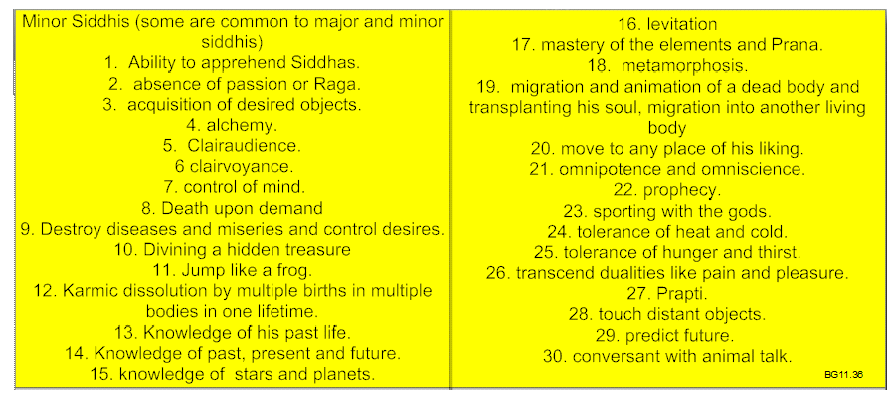Siddhis are the development of super natural powers by a student or aspirant of yoga when they reach the initial level or stage of samadhi called samprajnata samadhi (aka savikalpa samadhi). In this state, we are not fully immersed in the Universal (or Divine) Self. We are connected to it only from the outside and are not “one” with it. So, there is a sense of duality; “I and Universal Self”. It is at this stage that siddhis develop (or arise). There is the common yogic concept of the Ashta Siddhi (eight major siddhis). These are:
1. Anima : reducing one’s body even to the size of an atom
2. Mahima : expanding one’s body to an infinitely large size
3. Garima : becoming infinitely heavy
4. Laghima : becoming almost weightless
5. Prapti : having unrestricted access to all places
6. Prakamya: realizing whatever one desires
7. Isitva: possessing absolute lordship
8. Vasitva: the power to subjugate all.

Although Patañjali mentions the occurrence (and recognition) of 64 minor siddhis and 8 major siddhis (above) in the third chapter of his Yoga Sutras, he is very particular about warning the aspirant not to seek or be distracted by them. These siddhis become great obstacles to evolving spiritually. Patañjali warns that siddhis are not the aim or purpose of yoga practice. They are to be seen as signs that our sadhana is progressing toward the goal of unity (the ultimate goal of yoga). Siddhis are likely to tempt the aspirant, student or practitioner by powers and pride of one’s own achievements. But Patanjali says that the aspirant may be tempted even by the gods (who are jealous of mankind) to prevent him/her from reaching their goal. Steadfastness is the only way and no one should even develop any ego-sense that they are beyond such temptations. States similar to Samādhi can also be gained by various other means (like drugs) but they too are not to be pursued.
The attraction to these spiritual powers or siddhis is a common among spiritual seekers. It is an obstacle that causes us to divert from our path, thus stalling our progress towards Self-Realisation. It is rooted in our egotistic desire for fame and recognition. Because we do not yet have these powers, we can easily assume that those who have them are more advanced spiritually, even though they may be as much a slave to their past conditioning, negative thoughts and emotions as we are.
Even some of the most highly evolved spiritual beings like Swami Rama were not spared from this common desire.
I will close this article with the following story…
In his book, ‘Living with the Himalayan Masters’, Swami Rama told a story that he once met a swami who could shoot fire from his mouth for several feet. Swami Rama thought to himself that this man must definitely be more spiritually advanced that his master. Even the fire-thrower swami said to him, “You are wasting your time and energy staying with your master. Follow me and I will give you some real wisdom. I will show you how to produce fire”.
Swami Rama then went to his Master and told him, “I have found someone more advanced than you, I have decided to become his disciple.”
The Master replied, “I am delighted. Go ahead, I want you to be happy. What does he do?”
Swami Rama told him and his Master requested to meet this fire-thrower swami.
They walked for two days to meet this swami. When they arrived, Swami Rama was shocked to see the fire-thrower swami bowing down to his Master.
Swami Rama asked his Master, “Do you know him?”
His Master explained, “Of course. He left our monastery some time ago. Now I know where he has been hiding.”
At his Master’s request, Swami Rama asked the fire-thrower swami how long it took him to develop this ability. He proudly replied that it took him twenty years of practice to master this unique ability.
Swami Rama’s Master then said to him, “A match will produce fire in a second; if you wish to spend twenty years to produce fire from your mouth, you are a fool. My child, that is not wisdom.”
As Krishnamurti once said; “all these powers are like candles in the sun; they are like candle light when the brilliant sun is shining.”
Of related interest, click on: The Wisdom of Patanjali &
Patanjali’s Yoga Sutras and Advaita Vedanta
*Rae Indigo is ERYT500